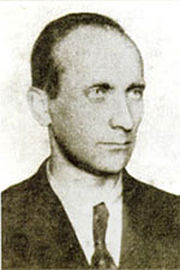- Dmytro Klyachkivsky
-
Dmytro Klyachkivsky 
Dmytro KlyachkivskyBorn November 4, 1911
Zbarazh, GaliciaDied February 12, 1945 (aged 33)
Orzhiv near RivneCause of death Killed in action Nationality Ukrainian Other names Klym Savur, Okhrim, Bilash Organization Ukrainian Insurgent Army Political party OUN Dmytro Klyachkivsky (Ukrainian: Клячківський Дмитро (Роман), also known by his pseudonyms Klym Savur, Okhrim, Bilash) (4 November 1911 - 12 February 1945) was a colonel of the Ukrainian Insurgent Army (UPA), first head-commander of the UPA-North. He was, according to Polish and American historians, responsible for ethnic cleansing of Poles from Volhynia.[1][2][3]
Contents
Biography
Klyachkivsky was born in the city of Zbarazh (at the time in the Austrian province of Galicia) as a son of a bank clerk. He completed his secondary studies and entered the Law faculty of the Jan Kazimierz University in Lwow. A member of the OUN, he served in the Polish Army and worked in the service sector in Stanislawow from 1934 until 1939 as chair of a committee of the Ukrainian sport organization Sokil in Zbaraz.
After joint Nazi and Soviet attack on Poland, Western Ukraine was occupied by the Soviet Union (see Polish territories annexed by the Soviet Union). Klyachkivsky was arrested by the Soviets (NKVD) in Lviv, and sentenced to death which was commuted to 10 years incarceration. He escaped from the Berdychev Prison in July 1941.
He was a member of the Directorate of the OUN in Lviv, the regional leader of OUN from January 1942, a member of the leadership of OUN and the first commander of the Ukrainian Insurgent Army from 1943. He was given the rank of Major and made the regional commander of UIA-North in 1944.
Massacres of Poles in Volhynia
Dmytro Klyachkivsky is regarded by Polish and American historians as the initiator of the massacres of Poles in Volhynia in modern-day western Ukraine in the years 1943-1945. It was his directive, issued in mid-1943, that stipulated the extermination of the entire Polish population across the province.[1] One Ukrainian Insurgent Army commander who opposed it was threatened by Klyachkivsky with court-martial.[2]
Evidence of his actions was found in SBU archives by Polish historian Władysław Filar and was published in 2000 year in his book "Before action Wisla, there was Volhynia". It was an order addressed to the commanders of the Ukrainian Insurgent Army in Volhynia. This secret directive stated:
“ We should undertake the great action of the liquidation of the Polish element. As the German armies withdraw, we should take advantage of this convenient moment for liquidating the entire male population in the age from 16 up to 60 years. We cannot lose this fight, and it is necessary at all costs to weaken Polish forces. Villages and settlements situated next to the large forests should disappear from the face of the earth.[3][4] ” Death
Klyachkivsky died in battle against the forces of the NKVD in January 1945 near the settlement of Orzhiv in the vicinity of Rivne. He was posthumously awarded the title of Colonel of the UIA and UIA Gold Cross of Military Honors First Grade.
See also
- Roman Shukhevych, general of the Ukrainian Insurgent Army
References
- ^ a b Matthew J. Gibney, Randall Hansen, Immigration and Asylum. Page 205. Google Books
- ^ a b Tadeusz Piotrowski, Genocide and Rescue in Wołyń. Page 187. Google Books
- ^ a b Władysław Filar, Anti-Polish actions of Ukrainian Nationalists (in Polish)
- ^ Tadeusz Piotrowski, Genocide and rescue in Wolyn, p. 180. Google Books
External links
- (Ukrainian) Dmytro Kliachkivsky
- (Ukrainian) Як загинув і де похований Клим Савур
- (Ukrainian) Ігор Марчук: Останній бій Клима Савура (фраґмент з історичної розвідки)
- (Ukrainian) How many soldiers were in Ukrainian Insurgent Army? Ukrainian Pravda (December 3, 2010)
Categories:- 1911 births
- 1945 deaths
- Ukrainian anti-communists
- People from Zbarazh
- Ukrainian people of World War II
- Ukrainian generals
- Organization of Ukrainian Nationalists
- Massacres of Poles in Volhynia
- Commanders of the Ukrainian Insurgent Army
Wikimedia Foundation. 2010.
